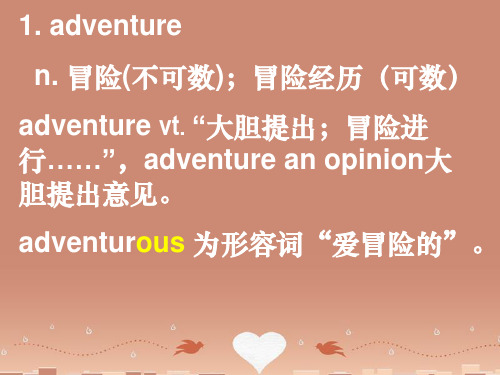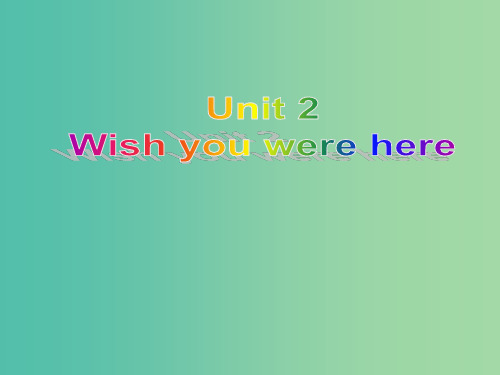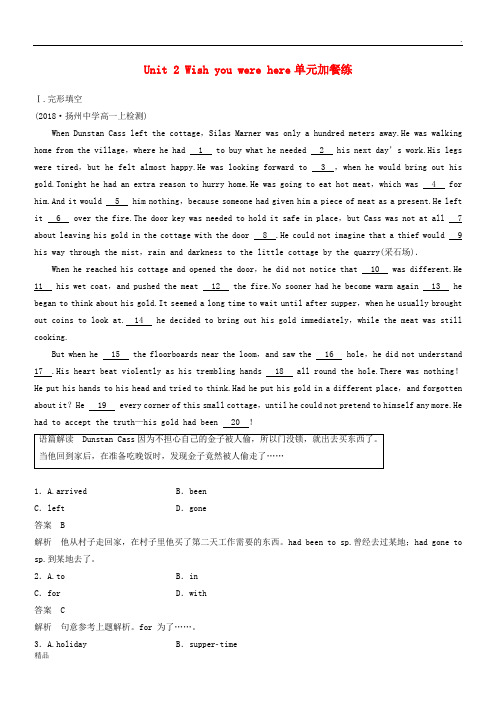2018_2019版高中英语Unit2WishyouwereherePeriodThreeTask讲
- 格式:doc
- 大小:277.00 KB
- 文档页数:16
![[小初高学习]2018-2019版高中英语 Unit 2 Wish you were here单元检](https://img.taocdn.com/s1/m/4d0cb8265f0e7cd18425364a.png)
单元检测试卷(二)第一部分听力(共两节,满分20分)第一节 (共5小题;每小题1分,满分5分)听下面5段对话。
每段对话后有一个小题,从题中所给的A、B、C三个选项中选出最佳选项,并标在试卷的相应位置。
听完每段对话后,你都有10秒钟的时间来回答有关小题和阅读下一小题。
每段对话仅读一遍。
1.What does the man ask for?A.Hot coffee.B.Iced coffee.C.Cold soda.2.What does the woman want to find?A.A cellphone.B.A map.C.A park.3.Why won’t the woman’s boyfriend attend the concert?A.He doesn’t want to go.B.He couldn’t get a ticket.C.He has other plans.4.Why will the woman stay home?A.To wait for a call.B.To watch a ball game on TV.C.To have dinner with a friend.5.What does the woman suggest the man do?A.Apply for a different job.B.Wait for an application form.C.Fill out an online application.第二节 (共15 小题;每小题1分,满分15分)听下面5段对话或独白。
每段对话或独白后有几个小题,从题中所给的A、B、C三个选项中选出最佳选项,并标在试卷的相应位置。
听每段对话或独白前,你将有时间阅读各个小题,每小题5秒钟;听完后,各小题将给出5秒钟的作答时间。
每段对话或独白读两遍。
听第6段材料,回答第6、7题。
6.What is the party for?A.A birthday.B.A graduation.C.A wedding.7.Where does the man’s cousin live now?A.In Houston.B.In New York.C.In Dallas.听第7段材料,回答第8、9题。


Unit 2 Wish you were hereTravelling is more important than reading books to understand people and the world.A book about another country tells you about things such as the country’s history,its people and its culture in a very general way.When meeting foreigners,I found that books can’t be trusted wholly.For example,when I was visiting Wisconsin University,many people there knew China through books.They thought Chinese people were not active,uneducated,had no sense of humor,and all wore blue suits.Through the videotapes shown by me,they were surprised to find that these facts were not true at all and the Chinese people are outgoing and have great intelligence(才能),dress well and have an equally strong sense of humor.Reading a book about another country makes me interested in travelling.Then I make plans to go and see what I have read about.In addition,people who go out and go through things themselves are likely to be openminded,and are really interested in making things happen.More and more Chinese travel at home or abroad.Especially the children who travel more will truly be full of knowledge about their own country.I have always felt enriched by the experience.It is only by “getting into action〞 that one can make a mark in this world,and truly live a meaningful life.根据上文完成以下各题1.Which is more important to understand people and the world,travelling or reading books?Travelling is more important than reading books.2.What did the author find when visiting Wisconsin University? Some foreigners misunderstood Chinese people through books.Period One Wele to the unit & ReadingⅠ.重点单词1.adventure n.冒险;冒险经历2.arrange vt.& vi.安排3.extraordinary adj.不同寻常的4.desert n.沙漠;vt.舍弃,抛弃5.dusty adj.尘土飞扬的,满是灰尘的dust n.尘土6.shade n.阴凉处;背阴;树阴7.brilliant adj.明亮的;鲜艳的8.altogether adv.总共9.unfortable adj.不舒服的,不自在的fortable adj.舒服的,自在的fort n.& vt.安慰;舒适10.rough adj.汹涌的;粗糙的;大概的roughly adv.粗略地11.protection n.保护protect v.保护12.advance n.前进;预先;vi.前进;进步13.supply n.& vt.提供,供给,补给14.defence n.防御;保护defend v.防御,保护;辩解,辩白15.scare vt.使恐惧,惊吓16.tiring adj.让人疲劳的,累人的tired adj.劳累的Ⅱ.重点短语1.in case万一2.in advance提前,预先3.up close靠近地4.make sure确保,务必;查明,确定5.look forward to盼望,期待Ⅲ.重点句式1.wish后接宾语从句Wish you were here希望你在这儿2.whatever引导名词性从句We’ll live with the local people in their villages,and eat and drink whatever they do,including cow’s blood!我们要跟当地的居民一起住在他们的村落里,不管他们吃什么、喝什么,我们也一起吃、一起喝,包括牛血!3.where引导非限制性定语从句After that,we’ll be moving on to Tanzania,where we’re going to climb Mount Kilimanjaro.此后,我们将继续前往坦桑尼亚,在那里我们要攀登乞力马扎某某。



Unit 2 Wish you were here单元加餐练Ⅰ.完形填空(2018·扬州中学高一上检测)When Dunstan Cass left the cottage,Silas Marner was only a hundred meters away.He was walking home from the village,where he had 1 to buy what he needed 2 his next day’s work.His legs were tired,but he felt almost happy.He was looking forward to 3 ,when he would bring out his gold.Tonight he had an extra reason to hurry home.He was going to eat hot meat,which was 4 for him.And it would 5 him nothing,because someone had given him a piece of meat as a present.He left it 6 over the fire.The door key was needed to hold it safe in place,but Cass was not at all 7 about leaving his gold in the cottage with the door 8 .He could not imagine that a thief would 9 his way through the mist,rain and darkness to the little cottage by the quarry(采石场).When he reached his cottage and opened the door,he did not notice that 10 was different.He 11 his wet coat,and pushed the meat 12 the fire.No sooner had he become warm again 13 he began to think about his gold.It seemed a long time to wait until after supper,when he usually brought out coins to look at. 14 he decided to bring out his gold immediately,while the meat was still cooking.But when he 15 the floorboards near the loom,and saw the 16 hole,he did not understand 17 .His heart beat violently as his trembling hands 18 all round the hole.There was nothing!He put his hands to his head and tried to think.Had he put his gold in a different place,and forgotten about it?He 19 every corner of this small cottage,until he could not pretend to himself any more.He had to accept the truth—his gold had been 20 !1.A.arrived B.beenC.left D.gone答案 B解析他从村子走回家,在村子里他买了第二天工作需要的东西。
Unit 2 Wish you were here单元加餐练Ⅰ.完形填空(2018·扬州中学高一上检测)When Dunstan Cass left the cottage,Silas Marner was only a hundred meters away.He was walking home from the village,where he had 1 to buy what he needed 2 his next day’s work.His legs were tir ed,but he felt almost happy.He was looking forward to 3 ,when he would bring out his gold.Tonight he had an extra reason to hurry home.He was going to eat hot meat,which was 4 for him.And it would 5 him nothing,because someone had given him a piece of meat as a present.He left it 6 over the fire.The door key was needed to hold it safe in place,but Cass was not at all 7 about leaving his gold in the cottage with the door 8 .He could not imagine that a thief would 9 his way through the mist,rain and darkness to the little cottage by the quarry(采石场).When he reached his cottage and opened the door,he did not notice that 10 was different.He 11 his wet coat,and pushed the meat 12 the fire.No sooner had he become warm again 13 he began to think about his gold.It seemed a long time to wait until after supper,when he usually brought out coins to look at. 14 he decided to bring out his gold immediately,while the meat was still cooking.But when he 15 the floorboards near the loom,and saw the 16 hole,he did not understand 17 .His heart beat violently as his trembling hands 18 all round the hole.There was nothing!He put his hands to his head and tried to think.Had he put his gold in a different place,and forgotten about it?He 19 every corner of this small cottage,until he could not pretend to himself any more.He had to accept the truth—his gold had been 20 !1.A.arrived B.beenC.left D.gone答案 B解析他从村子走回家,在村子里他买了第二天工作需要的东西。
(Advance with English Senior 1 Module2)Unit 2 Wish you were herePeriod 2 ReadingAn adventure in Africa Teaching aims:1.T rain the students’ reading ability.2.G et the students to know the main idea of the letter.3.D evelop the students’creative, comprehensive and consolidating abilities. Teaching important points:1.D evelop the students’ reading ability.2.H elp the students find out the traveling route.3.E ncourage the students to express their own opinions by radiant thinking. Teaching difficult points:1.How to help the students find out the traveling route.2.How to make the students understand the title “an adventure” well.3.How to encourage the students to express their own opinions by radiant thinking. Teaching methods:1.S canning to look for the places they will go to.2.F ast reading to find out the traveling route.3.C areful reading (from one place to another) to get the detailed information.4.S houting out answers together to encourage the students to think quickly5.R adiant thinking and discussion to develop the students’creative, comprehensive and consolidating abilities. Teaching procedures:Step 1: Scanning and fast readingT: Open your books. Do scanning and find out the places they will go to. If you find one, shout it out.S:…T: So many places! Where will they go first? And then, from where to where? Let’s readthe letter quickly to find out the traveling route.(wirte this word on the blackboard) I will show you an example --- first, they will leave London for Morocco. And then…?(to give a simple route map on the blackboard) S:…T: Now we can see their traveling route very clearly.Step 2: Careful readingT: Look at the map again. Which place catches your eye most?S: Sahara!T: Yes. Sahara --- the largest desert in the world --- catches our friends’ eye too. They will first travel there.Sahara (Para 2)T: Let’s do careful reading and find out the detailed information (Show them the following table). Is one minute OK?S: OK!(draw the table on the blackboard) …T: Let’s do it together (complete the table) …T: How long will it take?S: Six days.T: Six days! And now, just imagine how it feels to sit on camels for six days!S: Uncomfortable!T: Yes, the camel must be very uncomfortable because it will be very tired!Lake Victoria (Para 3)T: After traveling on camels, they will travel down the River Nile and then arrive at LakeVictoria. What will they do there? Read Para 3 to answer the three questions:1. What adventure activity will the writer try?2. Why does he want to do this adventure activity? (Very exciting!)3. What equipment is needed for this activity?T: What do they prepared for this activity? S:....T: Have you noticed the words dry and wet? Here both a dry bag and a wet suit are waterproof. And do you know this word (the rescue on the rope bag)? It just means saving. You know, this is only an activity in the trip, but why do they need so many kinds of equipment?S: Because it is very dangerous.Kenya (Para 4~5)T: Is white-water rafting exciting?S: Very exciting!T: Well, that’s the exciting activity in water.Ok,but then they want to do some else activity on land .let’s go to Kenya to experience such exciting activities! What should they take this time? You have only a few seconds to find them out…. Come on! Shout out!S: A backpack, supplies of food and water, a camera and a gun.T: Anything else? --- A guide! Anyhow, next time you go to Africa, don’t forget to take a guide, especially a local one.(if the students mentioned it,say this sentece after that) With so many things taken, they will start. What will they do there?(While the Students are looking for the answers, tell them: try to focus on verbs while reading. Then check their answers.) T: Will you drink cow’s blood?S: No!T: Yes, neither will I.Tanzania – Kilimanjaro(Para 6)T: Having done so many things, their travelwill finally come to an end in Tanzania. What will they do there?S: They will climb Mount Kilimanjaro.T:Yes. Read Paragraph 6 and find out the answer to this question: What is the common problem to mountain climbers? (After the Students answer it, tell them “Mountain Sickness”)T: Why will they feel sick?S: Because they are tired.T: Yes, mountain climbing is very tiring. So since now, if you want to climb mountains, first be sure to have a good rest. OK?Step 3: ConsolidationT: So far, we’ve known about Toby’s traveling plan. Let’s go over their plan again. First they will leave London for Morocco, and then where and how will they go? After that …(Let the Students go over the traveling route together again)T: Very obviously, this letter is about their traveling plan. But pay attention to the title---Why not use “A Trip in Africa”or “Our Travel in Africa”but use “An Adventure in Africa”? ---What is an adventure? ---Can you find out some adjectives in the letter to describe the travel? (dangerous, exciting, tiring, astonishing, uncomfortable, scary)T: Yes, it is dangerous, exciting… so we call it “an adventure”.Step 4: Radiant thinking1. QuestionsWill you take part in an adventure?What kind of adventure do you like? (mountain climbing, cycling, X-sports, searching for treasures, struggling for survival, walk through a forest…)2. DiscussionWhat hardships will you meet with in your adventure?What will you do in such situations?After discussion, about the second topic give the students some answers to do “True” or “False”.I will cry.I will do nothing but wait for help.I will try to send a message of SOS.I will work to find ways to solve the problems facing me.I will check and use what I have with me.I will despair and blame myself.I will manage to survive first.…T: Boys and girls, anyway, remember this: Whatever happens, never give up! (write this sentence on the Blackboard and ask the students to read it twice)after that,tell them,anyway,the life is most importante.3.A brain teaserA new situation--Suppose you are lost in a forest on a cold. Luckily you see a cabin in the distance. Inside, you find a candle, an oil lamp, paper and logs in a fireplace. You only have one match. What should you light first?•You have to light the match first.•Step 5: HomeworkWrite a postcard to your friends, introducing one of the places you have visited today in Africa.The design of the writing on theBlackboard:Unit 2 Wish you were herePeriod 2 ReadingAn adventure in AfricaDraw the traveling routeThe table to introduce the adventureWhatever happens, never give up!Some new words。
Period Three Task
Ⅰ.重点单词
1.view vt.观看;看待;n.景色;观点
2.heaven n.天堂;天空
3.mountaintop n.山顶
mountain n.山
4.temple n.寺院
5.bury vt.埋葬;埋藏
6.destination n.目的地
7.cage n.笼子
Ⅱ.重点短语
1.look out for密切注意,提防
2.pay attention to注意
3.(be) known as作为……而闻名
Ⅲ.重点句式
“疑问词+to do”作宾语
Here are some tips on what to look out for.
这里有一些关于应该留意什么的建议。
重点词汇
1.When we are trying to gather information on travel plans,we need to recognize dates and place names from various sources.当我们努力从旅行计划中搜集信息时,我们需要从各种资源中辨认日期和地方名称。
(1)It’s recognized that Yuan Longping is a great scientist.袁隆平是一位伟大的科学家,这是大家公认的。
(2)The book is now recognized as/to be a classic.
这本书现在是一部公认的经典著作。
(3)The village had changed so much that it was beyond recognition.这个村子变化太大,都认不出来了。
[单项填空]
(4)—Oh,it’s you!I you.
—I’ve just had my hair cut.What’s more,I’m wearing new glasses.
A.didn’t recognize B.didn’t know
C.hadn’t known D.haven’t recognized
答案 A
解析从句意分析,对话的双方已互相认出,所以“没认出”是发生在以前的事,故用一般过去时。
2.Take a night train to Fenghuang to view a traditional way of life.
坐夜班车到凤凰古城去观看传统的生活方式。
(1)I now regularly compare my views with those of many others.我现在定期把自己的观点与很多他人的观点进行比较。
(2)They view the attack on the ship as an act of war.
他们把攻击那条船视作战争行为。
(3)In my view/In the view of me,he is the best person for this job.
我个人认为他是这份工作的最佳人选。
[易混辨析] view,sight,scene,scenery
※view常指在远处或高处从个人角度看到的景色的一部分。
※sight多指某地特有的风景、名胜。
用复数形式,指人文景观。